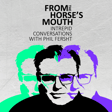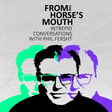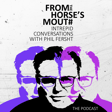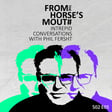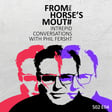
Episode 2: Riptide of Change - Heather E. McGowan, Best-selling Author of 'The Empathy Advantage: Leading the Empowered Workforce’
In the latest episode of From the Horse’s Mouth, Phil Fersht sits down with Heather E. McGowan to discuss the powerful currents reshaping the world of work. They explore how the "riptide of change"—a convergence of rapid technological advances, shifting demographics, and evolving societal norms—is impacting human connections in the workplace. Heather offers insights on how leaders can navigate these forces by fostering empathy, purpose, and genuine relationships within their teams. They also examine the role of generative AI, considering how to integrate new technologies without losing the human element essential for innovation and resilience.
Listeners will come away with practical strategies for embracing change instead of resisting it. Heather highlights that by nurturing empathy and authentic connections, leaders can steer their organizations through uncertain waters. The episode wraps up with actionable advice on harmonizing technological advancements with the human touch, empowering teams to become more adaptable, united, and ready to face the future.



